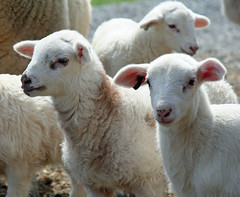The uterine environment for developing fetuses is influenced by sex of the co-twin and the effects vary by species. Although freemartinsim is rare in prolific species, such as sheep, effects of co-sibling sex on development have been reported in numerous species, including humans.
 |
| Twin Katahdin ewe lambs |
Nine years of lambing records from the University of Wyoming's Suffolk, Hampshire, Columbia, and Rambouillet purebred flocks were analyzed to determine if the sex of the co-twin had any effect on the number of offspring, flock longevity, and age at first lambing of ewes retained for breeding.
Ewes born as singles had fewer lambs during their productive lifetime than ewes born co-twin with ewes, but did not differ from ewes born co-twin with rams. Among the twin-born ewe lambs, the presence of a male co-twin tended to decrease the number of lambs born, but it did not affect longevity. Nor did it affect age at first lambing.
Source: Effect of Sex of Co-Twin and Breed on Ewe Flock Productivity, 2010 Proceedings of the U.S. Sheep Research and Outreach.

No comments:
Post a Comment